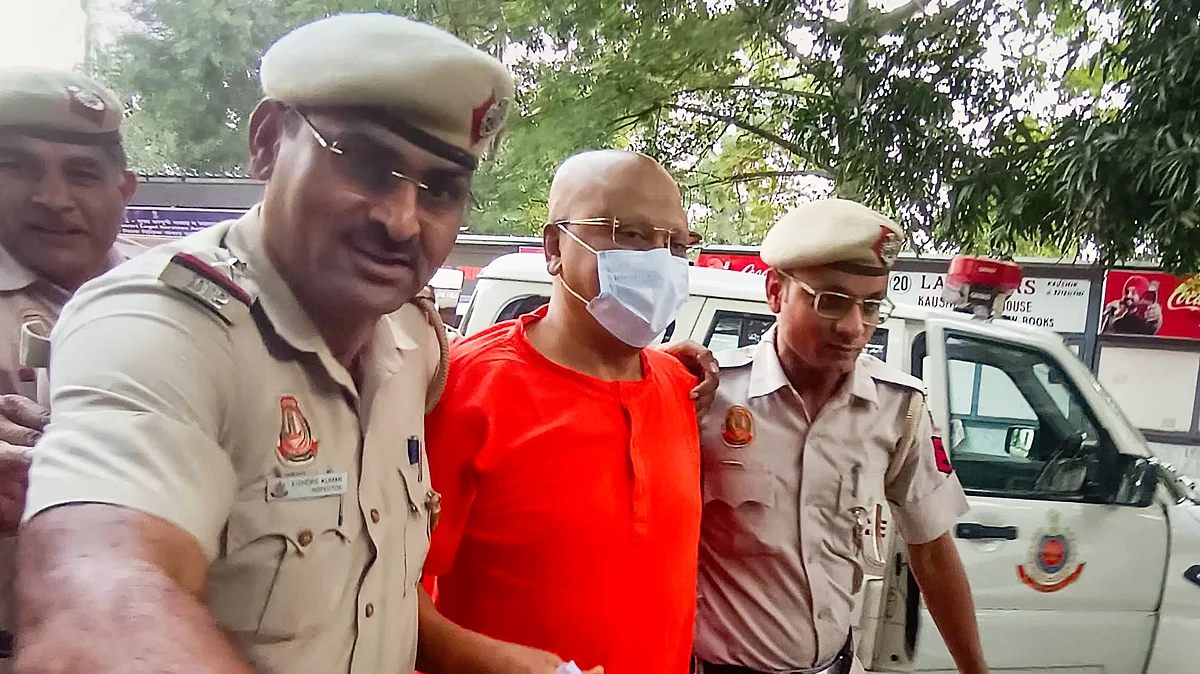Delhi court sends Chaitanyananda Saraswati to judicial custody
Saraswati, a former chairman of a private management institute in Delhi, has been accused of molesting 17 women students

A Delhi court on Friday remanded self-styled godman Chaitanyananda Saraswati to 14 days’ judicial custody in connection with a case of alleged sexual harassment of students.
The Delhi Police produced the 62-year-old before metropolitan magistrate Animesh Kumar at Patiala House Courts following the completion of his five-day police custody. Investigators had requested judicial custody, citing the gravity of the offences and the ongoing inquiry into financial irregularities linked to him.
Saraswati, a former chairman of a private management institute in southwest Delhi, has been accused of molesting 17 women students. According to the FIR in the case, he allegedly coerced female students to visit his private quarters late at night and bombarded them with inappropriate messages at odd hours. Investigators further claimed that he monitored students’ movements through a mobile application connected to the institute’s CCTV cameras.
During the hearing, Saraswati’s counsel requested access to the seizure memo and case diaries, which the court allowed. Additional applications sought permission for the accused to wear monk’s robes, receive prescribed medicines, and consume food consistent with sanyasi traditions. The court directed police to file their response.
Saraswati was arrested in Agra on 28 September. Police had earlier frozen Rs 8 crore belonging to him, spread across multiple bank accounts and fixed deposits. Investigators also alleged that he operated under different names and particulars to open accounts, withdrawing over Rs 50 lakh after the FIR was filed. Officials said fake visiting cards were seized from him, falsely identifying him as being associated with the United Nations and BRICS.
The arrest of Saraswati adds to a growing list of controversial Indian godmen who have faced charges of sexual exploitation and financial fraud.
One of the most notorious cases is that of Asaram Bapu, once a high-profile spiritual leader with a vast following. In 2018, he was sentenced to life imprisonment for raping a teenage girl at his ashram in Jodhpur. His conviction followed years of allegations of abuse and witness intimidation.
Similarly, Gurmeet Ram Rahim Singh, head of the Dera Sacha Sauda sect, is currently serving multiple prison terms. Convicted in 2017 of raping two female followers, he was later sentenced to life for the murder of a journalist who had exposed his crimes. His conviction triggered widespread violence by his supporters in Haryana and Punjab.
Other figures include Swami Premananda, who died in prison while serving a double life sentence for rape and murder, and Swami Nithyananda, a controversial guru who fled India after being charged with rape in 2010 and has since claimed to have founded his own island-nation called 'Kailasa'.
These cases have repeatedly highlighted how self-styled godmen, often commanding immense loyalty and wealth, have used their positions of influence to exploit vulnerable followers.
Police continue to probe Saraswati’s financial dealings and the extent of his alleged misconduct. Officials say the investigation is likely to widen as evidence of forged documents and suspicious money trails has emerged. Meanwhile, the court’s remand order ensures he will remain in Tihar Jail until the next hearing.
With PTI inputs
Follow us on: Facebook, Twitter, Google News, Instagram
Join our official telegram channel (@nationalherald) and stay updated with the latest headlines
